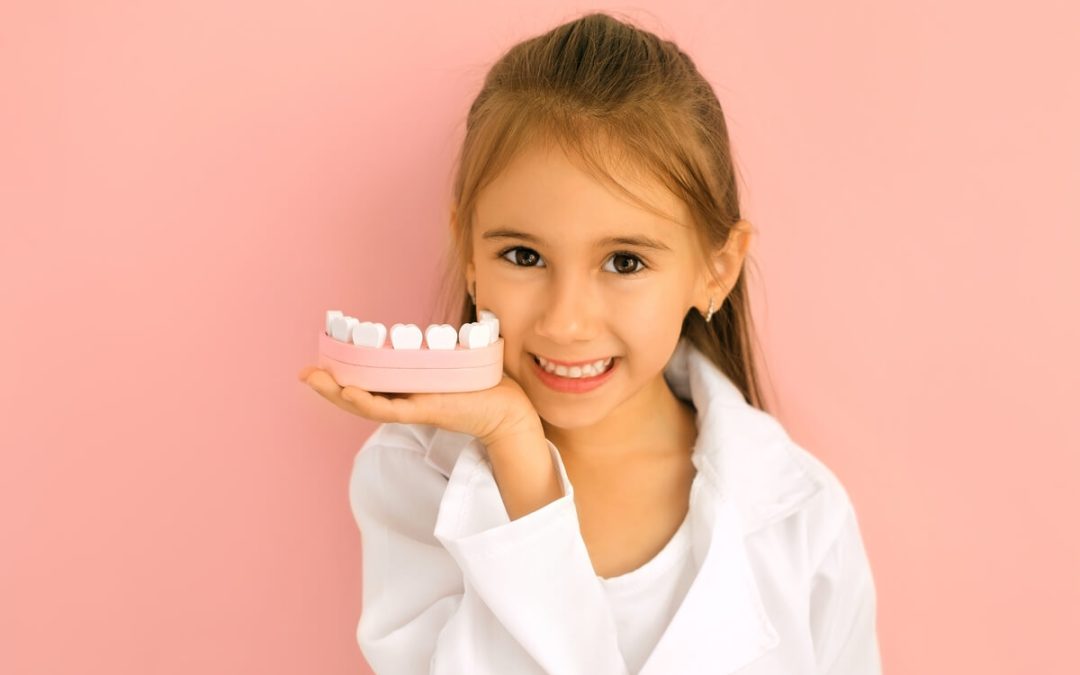As a parent, ensuring your child has good dental health is likely always at the forefront of your mind—but do you know what to look for when it comes to tooth decay? Did you know that tooth decay in children can cause pain and discomfort and even limit their ability to eat, drink, speak, and socialise?
Thankfully, some common signs indicate whether or not a visit to the dentist is necessary. In this article, we will outline the symptoms of mild tooth decay as well as provide helpful tips on how best to prevent it from happening.
What is Tooth Decay and How to Spot it in Kids
 Tooth decay, also known as tooth cavities and tooth caries, is a growing concern for children of all ages. The primary cause of tooth decay in kids is prolonged exposure to tooth enamel-damaging acids and bacteria in their mouths.
Tooth decay, also known as tooth cavities and tooth caries, is a growing concern for children of all ages. The primary cause of tooth decay in kids is prolonged exposure to tooth enamel-damaging acids and bacteria in their mouths.
This can happen when a child does not brush their teeth enough and/or has poor eating habits. Parents and guardians need to spot tooth decay at an early age in order to prevent further damage by visiting a trained professional, such as a dentist or dental hygienist.
Keeping up with brushing habits and watching what your child consumes can help save dental costs in the future, and it’s essential to the health of their permanent teeth, ensuring healthy, happy smiles for life!
The Differences Between Early Childhood Caries and Baby Bottle Tooth Decay?
Tooth decay in children can be divided into two categories: Early Childhood Caries (ECC) and Baby Bottle Tooth Decay (BBTD). ECC affects the teeth of babies under the age of three and is caused by frequent exposure to sugary liquids, which creates plaque that erodes tooth enamel.
BBTD occurs more often among babies ages six months to two years and is usually caused when sugary liquids are left in the baby’s mouth for long periods over several days, resulting in cavities.
Preventing both conditions requires diligent oral hygiene practice as early as possible, from the moment their first tooth appears, including brushing their teeth twice a day, flossing regularly, and avoiding sugary foods and drinks, especially before bedtime.
Early Warning Signs of Tooth Decay in Toddlers and Young Children
Taking good care of your toddler’s and young child’s teeth is incredibly important to their long-term oral health, but it can be overwhelming to know what early warning signs of tooth decay you should be looking out for.
 As a parent, knowing the signs of a potential tooth issue will allow you to point it out to your dentist sooner and have it addressed or treated faster.
As a parent, knowing the signs of a potential tooth issue will allow you to point it out to your dentist sooner and have it addressed or treated faster.
Common early warning signs of dental decay include discoloured spots on the enamel, cracked or smooth areas on their teeth, bad breath, painful sensitivity when consuming hot or cold foods or beverages, tenderness in their gums, and trouble chewing.
If you notice any of these issues with your little one’s teeth, contact your child’s dentist right away to discuss further treatment options. Early intervention with these types of problems is the key to avoiding pain and discomfort for years down the road.
The Different Types of Cavities and their Impact on Children
Cavities are a common issue for children and can cause significant discomfort and damage to their teeth if not taken care of. The three main types of cavities that might present themselves in children’s mouths include:
- diagnostic (which appears as brown spots on primary teeth)
- smooth surface (which occurs between two adjacent surfaces or contact points)
- and root (which form on the exposed roots of teeth)
Cavities are caused by bacteria in plaque, which build up around the gums, feeding off sugar particles left behind from our meals or snacks. Prevention is always better than cure, so it’s important to educate children at an early age about proper oral hygiene, such as brushing twice a day and limiting candy consumption. However, when cavities do take place, it is essential to receive regular dental check-ups and fillings from a professional to ensure healthy smiles.
How to Prevent Tooth Decay in Kids from an Early Age
Taking preventative steps to protect your young kid’s teeth from tooth decay is essential for ensuring healthy smiles in the future. Bad oral hygiene in childhood can lead to serious issues down the road, so it is important to start a strong, healthy dental regimen early on.
Teaching your little one that brushing their teeth twice a day, flossing once daily, and visiting the dentist regularly are all very important pieces of their dental health puzzle.
This teaching should be reinforced with morning and nighttime brushing routines, as well as treats that don’t contain too much sugar for cavity prevention. Remember, being proactive about dental care helps to save money down the line!
Healthy Diet To Prevent Tooth Decay
Brushing and flossing are only part of the equation when it comes to protecting your child’s teeth from decay. Eating habits, as well as what type of food and drinks they consume, also play a role in their oral health and can lead to an increased risk for cavities.
 Babies under six months
Babies under six months
Newborns and babies must exclusively consume breastmilk or formula until solid food is introduced around six months.
Don’t make the mistake of dipping a pacifier into any type of food, sugar, honey, or other liquid – your baby may love it now, but you’ll regret it later!
Babies over six months
When your baby is over six months, you may introduce them to small amounts of water. However, avoid giving sugary drinks or fruit juice as these can be harmful to their development. If your infant enjoys a dummy, never dip it in sugary foods or liquids, like honey or sugar.
Older babies, children, and teenagers
Healthy snacks are essential for children’s growth and development. Foods with low sugar content should be prioritised instead of offering sweet treats like biscuits or cakes. If your child does consume something sugary, make sure to follow up with a glass of water or tooth-friendly foods that help reduce the acidity on their teeth.
Which Children Are At Risk For Dental Decay?
Children of all ages are prone to developing dental caries, more commonly known as tooth decay. While any child could potentially suffer from this oral health issue, certain factors can make a child more vulnerable to tooth decay.
- First and foremost, without proper oral care, such as brushing and flossing regularly, children’s baby teeth are at greater risk for cavities.
- Additionally, poor nutrition and frequent snacking on sugary snacks or beverages also increase the chances of having cavities.
- Finally, genetics can play an important role in a child’s predisposition to cavities. If parents or other family members have had unhealthy teeth or dealt with issues related to tooth decay previously, the same may be true for the child as well.
Fortunately, proper preventative measures can reduce the likelihood of a child developing tooth decay.
Addressing Chronic Tooth Decay Issues with a Dentist
Having good dental hygiene is a vital part of caring for ourselves, but chronic tooth decay can be an issue that affects people of all ages, including kids and children. Fortunately, there are ways to address this problem.
 Working with a dentist to develop the right strategy can make all the difference when it comes to managing tooth decay. A dentist can review your child’s oral health and recommend regular check-ups or treatments that may be needed in order to maintain their dental health.
Working with a dentist to develop the right strategy can make all the difference when it comes to managing tooth decay. A dentist can review your child’s oral health and recommend regular check-ups or treatments that may be needed in order to maintain their dental health.
They also offer preventative advice, such as proper brushing techniques and diet choices, in order to help keep their teeth and gums healthy.
Waiting too long to seek help from a qualified professional may lead to serious oral problems for their adult teeth in the future.
How Is Tooth Decay Treated In A Child?
Children tooth decay is a common problem faced by families all around the world, so it’s important to treat it promptly. Thankfully there are many reliable treatment options available for dealing with tooth decay in children. Tooth restorations, such as fillings, can fix cavities that have developed due to tooth decay.
In more serious cases, crowns and other prosthetic devices may be used to replace damaged and decayed teeth. For preventing tooth decay, paediatric dentists usually recommend twice-daily brushing with fluoride toothpaste and regular flossing.
Additionally, cutting down on sugary drinks and snacks will help significantly reduce the risks of new cavities developing. Treating tooth decay in children is critical for their oral health care, so it’s important to act quickly if any symptoms arise.
Takeaways
Taking care of your child’s teeth starts with understanding the risks and causes of early tooth decay. Equipped with the knowledge from this article, parents can work to spot potential issues in their child’s oral health and respond accordingly.
Tooth decay prevention for young kids should focus on regular brushing, fluoride treatments, and monitoring the foods and drinks that pass through their lips. Incorporating these tips into a daily routine should help ensure healthy teeth for years to come.
If you suspect your child has an issue with tooth decay, it is important to reach out to our professionals at Dental Excellence by calling on (02) 6188 7293, who have extensive experience in paediatric dentistry. With their help, chronic issues can be identified and addressed before major damage occurs, and a lifetime of healthy smiles can be achieved!
Sources
Tooth decay – Young children
https://www.betterhealth.vic.gov.au/health/conditionsandtreatments/tooth-decay-young-children
Tooth decay in children
https://www.urmc.rochester.edu/encyclopedia/content.aspx?ContentTypeID=90&ContentID=P01848
Dental Caries (Tooth Decay) in Children Ages 2 to 11 Years
https://www.nidcr.nih.gov/research/data-statistics/dental-caries/children
Children’s oral health
https://www.cdc.gov/oralhealth/basics/childrens-oral-health/index.html

